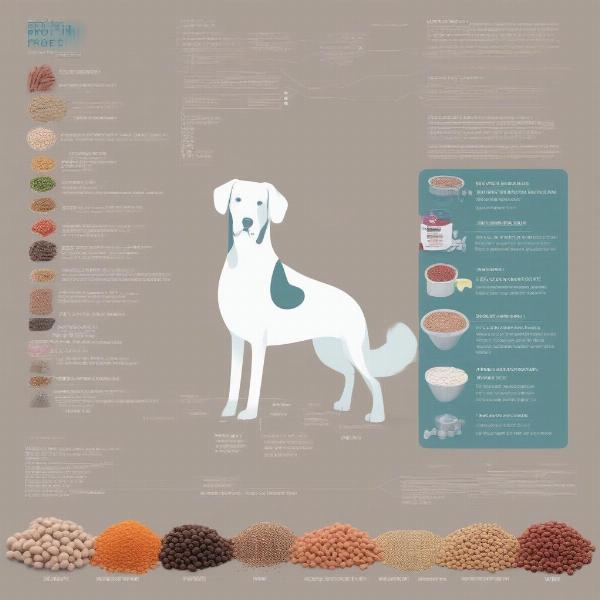Choosing the right weight loss dog food can be a daunting task, especially with so many options available. Understanding your dog’s specific needs and the key ingredients to look for is crucial for successful and healthy weight management. This guide will help you navigate the world of weight loss dog food and empower you to make informed decisions for your furry friend’s well-being.
Understanding Your Dog’s Weight Loss Needs
Before diving into specific dog food options, it’s essential to understand why your dog needs to lose weight and what factors contribute to canine obesity. Common causes include overfeeding, lack of exercise, underlying health issues, and even breed predisposition. Consult your veterinarian to rule out any medical conditions and establish a safe and effective weight loss plan.
Factors Contributing to Canine Obesity
- Overfeeding: Providing too many calories, even healthy ones, can lead to weight gain.
- Lack of Exercise: Insufficient physical activity contributes to calorie surplus and weight gain.
- Health Issues: Certain medical conditions, such as hypothyroidism, can contribute to obesity.
- Breed Predisposition: Some breeds are more prone to weight gain than others.
Key Ingredients in Weight Loss Dog Food
Weight loss dog food typically focuses on higher protein, lower fat, and increased fiber content. Protein helps maintain muscle mass during weight loss, while fiber promotes satiety, preventing your dog from feeling constantly hungry. Look for dog foods with lean protein sources like chicken, turkey, or fish, and avoid excessive amounts of saturated fats.
Protein Power for Weight Loss
High-quality protein sources are crucial for supporting muscle mass during weight loss. Look for ingredients like chicken, turkey, fish, or lean beef.
Fiber for Fullness
Fiber adds bulk to the diet, helping your dog feel full and satisfied, which can reduce overeating. Ingredients like beet pulp, brown rice, and sweet potatoes are excellent sources of fiber.
 Analyzing Dog Food Ingredients for Weight Loss
Analyzing Dog Food Ingredients for Weight Loss
Choosing the Right Weight Loss Dog Food
Selecting the best weight loss dog food for your pet involves considering their age, breed, activity level, and any existing health conditions. Always opt for high-quality brands that prioritize natural ingredients and avoid artificial fillers, colors, and flavors.
Age and Breed Considerations
Puppies and senior dogs have different nutritional requirements compared to adult dogs. Certain breeds also have specific predispositions to weight gain or other health concerns.
Activity Level and Health Conditions
A highly active dog will require more calories than a less active dog, even when on a weight loss diet. If your dog has any health conditions, consult your veterinarian for dietary recommendations.
Monitoring Your Dog’s Progress
Regularly monitoring your dog’s weight and adjusting their food intake as needed is vital for successful weight management. Keep track of their progress and consult your veterinarian if you have any concerns.
Conclusion
Choosing the right weight loss dog food is an important step towards a healthier and happier life for your canine companion. By understanding your dog’s needs, focusing on key ingredients, and monitoring their progress, you can help them achieve their ideal weight and enjoy a more active and fulfilling lifestyle. Remember to consult your veterinarian for personalized advice and guidance throughout your dog’s weight loss journey.
FAQs
- How much weight loss dog food should I feed my dog? Always follow the feeding guidelines on the dog food packaging and adjust based on your veterinarian’s recommendations and your dog’s individual needs.
- Can I give my dog treats while they’re on a weight loss diet? Yes, but choose healthy, low-calorie treats and factor them into their daily calorie intake.
- How long will it take for my dog to lose weight? Weight loss is a gradual process, and the timeframe varies depending on the dog’s individual circumstances. Consult your veterinarian for realistic expectations.
- What are some signs that my dog is losing weight too quickly? Rapid weight loss can be harmful. Signs include lethargy, weakness, and loss of muscle mass. Consult your veterinarian if you notice any of these signs.
- What should I do if my dog isn’t losing weight on weight loss food? If your dog isn’t losing weight as expected, consult your veterinarian to rule out any underlying health issues and adjust the weight loss plan accordingly.
- Are there any natural supplements that can aid in weight loss for dogs? Consult your veterinarian before giving your dog any supplements, as some can interact with medications or have adverse effects.
- How can I encourage my dog to exercise more? Try incorporating fun activities like walks, fetch, or swimming into your dog’s daily routine.
About ILM Dog
ILM Dog is your trusted source for expert advice on dog care and nutrition. We offer comprehensive resources on breed selection, health and medical care, training, behavior, nutrition, grooming, and much more. We’re dedicated to helping you provide the best possible care for your furry friend. For expert guidance on choosing the best weight loss food for dogs, contact us via email at [email protected] or phone at +44 20-3965-8624.